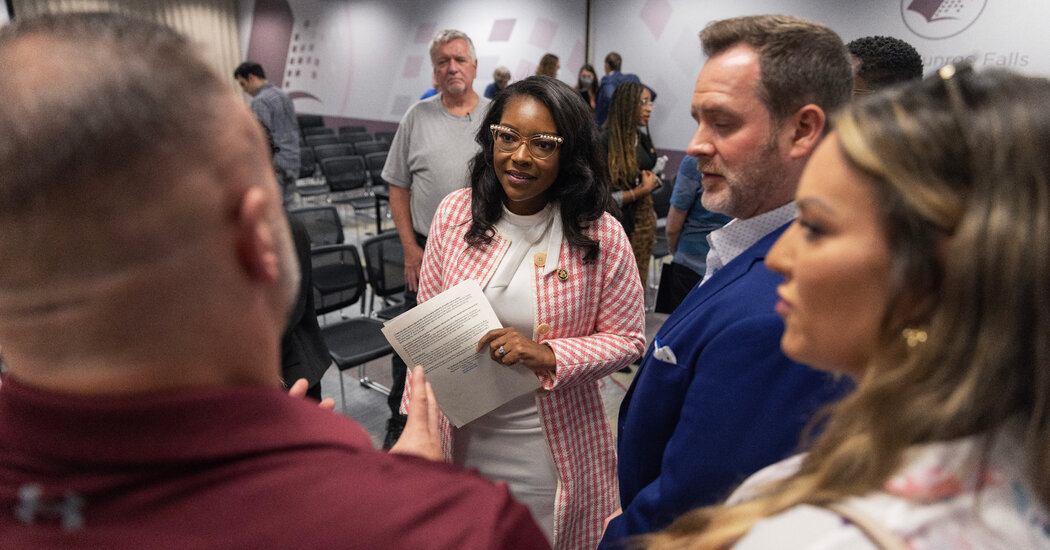When Representative Emilia Sykes arrived at the regional airport in Akron on a recent Thursday morning to meet with dozens of local elected officials, she was the only Black person in the room.
It wouldn’t be long before two others took seats in the audience, but it soon became clear that they were both related to her. Ms. Sykes briefly interrupted her remarks to welcome her parents: Vernon Sykes, a state senator, and Barbara Sykes, who sits on the Akron School Board.
It is the kind of room that Ms. Sykes, 38, a first-term Democrat, is familiar with as one of only about a dozen Black members of Congress representing a majority-white district. And as she fights to defend her seat in a year when control of the House of Representatives is up for grabs, it represents a critical piece of the coalition that Ms. Sykes is toiling to keep together — one that includes a strong Democratic base but also a sizable portion of independents and moderate Republicans who crossed over to help her win the seat in 2022.
Republicans, who hold a razor-thin majority and are toiling to keep their grasp on the House, have identified her as a top target for defeat in a district rated as a “tossup” by the nonpartisan Cook Political Report. Her G.O.P. challenger, Kevin Coughlin, who is white, is a former state lawmaker who is well known in Akron politics.
For Ms. Sykes, beating back the challenge means reminding voters as clearly and as often as possible what she has done to benefit them directly during her time in Congress. It also means steering clear of the bitter partisanship that is defining the presidential race and toiling to keep the focus off President Biden and former President Donald J. Trump, both of whom were viewed unfavorably by a majority of respondents in the latest New York Times/Siena poll.
“What my focus is, is making sure that my constituents understand what I’ve been doing,” Ms. Sykes said in an interview. “And we can translate that work into votes.”
She delivered the message during a recent swing through Ohio’s 13th Congressional District, which is centered around Akron, stretching to include more rural communities north of Cuyahoga Falls and extending down to Canton, home of the Pro Football Hall of Fame. At stop after stop, Ms. Sykes highlighted her role in helping to secure nearly $15 million in federal funding for projects in the district through earmarks, listened to pleas about future projects that need to be funded and laid out plans to seek more federal dollars during this year’s appropriations process.
Unlike her ultraprogressive colleagues of color known as “the squad,” Ms. Sykes avoids the cable television circuit and social media. She prioritizes interviews with local news outlets and has a well-established routine of hosting community events where she hopes attendees come away feeling they have access to her and her team. She has aimed to distance herself from both presidential candidates, pushing back on Republican efforts to try to tie her closely to Mr. Biden, who trails badly in Ohio, a state that Mr. Trump won by eight percentage points both in 2016 and in 2020.
“Biden and Trump don’t live in Ohio’s 13th district. Those aren’t the people I need to be close to. I need to be close to the people in the district,” Ms. Sykes said, declining repeatedly to discuss Mr. Biden’s record or policies or to talk about how Mr. Trump’s conduct and agenda might impact her re-election bid. “I truly believe constituent services is the best incumbent protection plan that exists, because this is my job performance.”
(The interview took place before Mr. Biden’s disastrous debate performance. Ms. Sykes did not respond afterward to a request for comment about whether the president should remain in the presidential race and whether it would have any impact on her race if he did.)
Her fate this year also is a test of whether Black Democrats can maintain and expand a foothold in Congress in districts that do not look like them.
The 118th Congress is the most racially and ethnically diverse in history, reflecting the growing diversity of the nation, but both the House and Senate remain disproportionately white. And though a quarter of members identify as Black, Hispanic, Asian American, American Indian, Alaska Native or multiracial, the vast majority of those members represent gerrymandered districts with large groups of minority voters.
Other Black members of Congress facing competitive challenges this year in similarly white districts include Representatives Don Davis in North Carolina, Jahana Hayes in Connecticut and Steven Horsford in Nevada — all of whom hold seats being targeted by Republicans as prime pickup opportunities. The national House campaign arms for both Democrats and Republicans have poured millions of dollars into each of the races, underscoring how critical they could be to determining control of Congress in November.
It’s the kind of challenge Ms. Sykes has spent most of her political life navigating, ever since she succeeded her father in 2015 as a member of the Ohio House of Representatives.
“Even my state legislative district wasn’t majority Black. So I’ve never represented a majority Black community,” Ms. Sykes said. “But when I focus on the people in the work that they sent me to do, it’s served me well.”
An Akron native, Ms. Sykes grew up in a politically active household. Both of her parents served on the Akron City Council when she and her sister were very young, and they both went on to serve in Ohio’s state legislature. Among the three of them, the younger Ms. Sykes and her parents held the same state House seat from 1983 to 2022.
The family dynasty gave Ms. Sykes an early political education, as she watched her parents do their jobs, answered calls when constituents dialed their home number and traveled across the state with them to events filled with residents of their district from a wide range of backgrounds.
“Emilia traveled with us so much and she was, of course, most often the only child in the room,” the elder Ms. Sykes, the first Black woman to be elected to the Akron City Council, said in an interview. “She would listen and then after we left, she’d have questions. Ever since she was young, she’s had a way of dealing with people of all ages, all races and all religions. And she’s comfortable in these settings.”
In a community far less diverse then than it is now, having two Black parents in public life, Ms. Sykes learned to weather attacks and ridicule.
Barbara Sykes recalled the time a school-age Emilia confronted a classmate who had insulted her mother’s physical appearance after seeing her on television.
“Emilia said back to him, ‘My mom is on TV; where is your mom?’”
Now, it is the younger Ms. Sykes who has found herself a target. An attack ad against her run by the National Republican Congressional Committee uses a dark filter that casts an ominous tone and deepens her complexion, seeking to portray the congresswoman as weak on crime and a threat to the safety of the voters in her district and beyond.
“It just is something that we have to deal with,” Ms. Sykes said. “We recognize it. We deal with it, and we move on.”
Her father said Ms. Sykes’s upbringing prepared her to persevere through such negativity.
“You know, race just becomes one of the predominant factors and it is oftentimes a difficult thing to overcome,” Mr. Sykes said.
It is not all about playing defense. Across the country, Democrats have also recruited Black candidates to challenge vulnerable Republicans in majority-white areas. One such seat that party organizers hope to flip is in Oregon’s Fifth Congressional District, where Janelle Bynum, a Black state lawmaker, is running to unseat Republican Representative Lori Chavez-DeRemer in another race rated by Cook as a “tossup.”
There too, Ms. Bynum is battling to overcome concerns about her electability as a Black woman in a competitive district.
“Oregon is not a very diverse place in terms of African Americans,” said Ms. Bynum, who became the first Black woman elected to the state’s House of Representatives in 2017. “The history of our state is such that we weren’t welcome here.”
Despite all that, she opted to launch her campaign with an ad featuring her husband and children — a decision she called a gamble.
“To see a Black family on TV is not — it’s not normal,” she said, adding that she hoped voters would embrace it.
Ms. Sykes said she and candidates like her are working to persuade both voters and their own party’s establishment that minority candidates, especially those with legislative backgrounds and proven records in their communities, are just as capable as their white counterparts no matter the demographic makeup of the district they are running in.
“Black candidates can win everywhere if we are given the opportunity and we are able to compete on the same playing field,” Ms. Sykes said. “We are used to working twice as hard to get the same results as some of our counterparts.”





